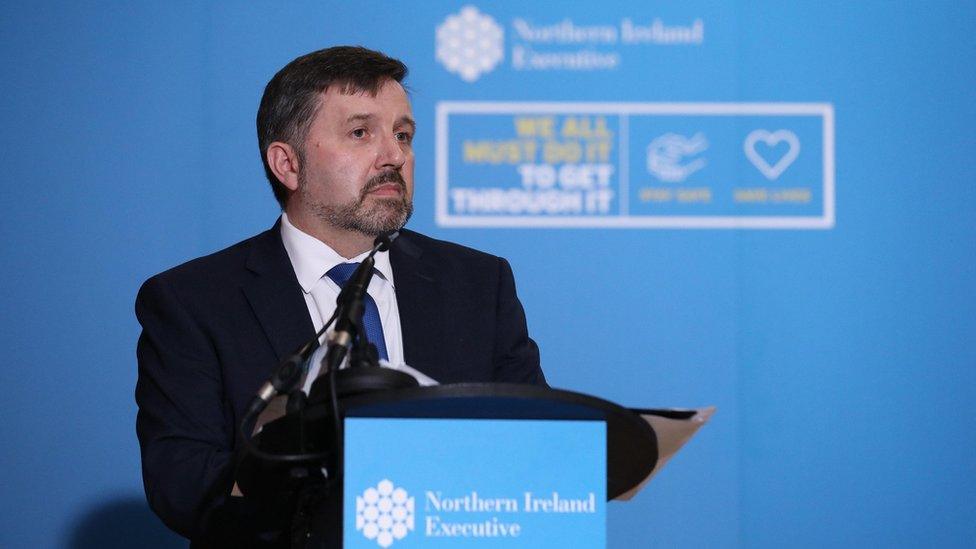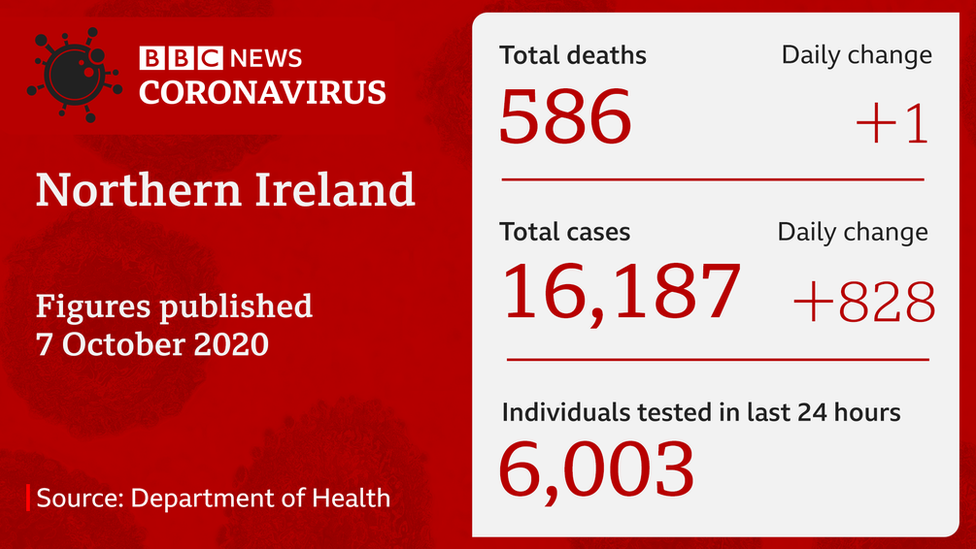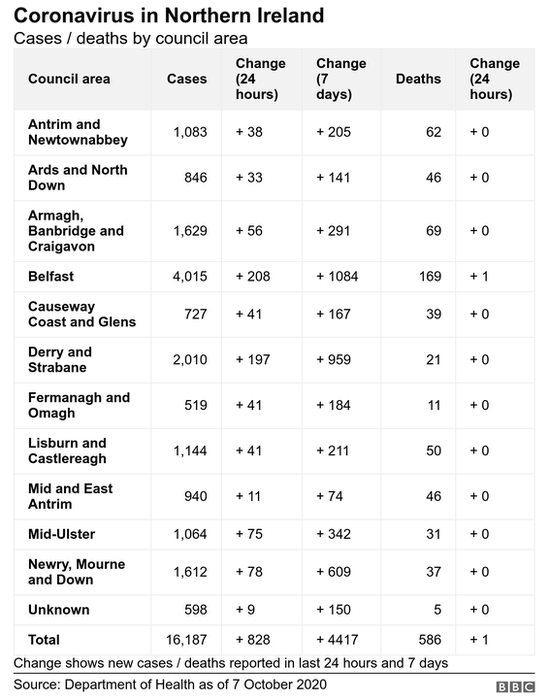Coronavirus: Health appeals 'falling on too many deaf ears'
- Published

NI's Health Minister Robin Swann has said he is concerned that appeals to abide by coronavirus regulations are "falling on too many deaf ears".
Mr Swann was speaking after 828 new cases of the virus were confirmed in Northern Ireland on Wednesday.
One further death was also confirmed by the Department of Health.
The minister said that the increase in infections was outpacing the increase in testing.
Speaking at Wednesday's Stormont press briefing, Mr Swann accused those breaching the rules and guidance of giving "a two-fingered salute" to the rest of the population.
"It's what I would now call wilful complacency," he added.
"It beggars belief that some people would object to wearing face coverings - it's just a piece of cloth, but it does make a difference."
In the last seven days, 4,417 people have tested positive for the virus - 1,084 of those have been in the Belfast City Council area, 609 in Newry, Mourne and Down and 959 in the Derry City and Strabane area.
Pubs, restaurants and hotels in Derry and Strabane have been operating under tighter coronavirus restrictions since Monday.
The minister said the executive had the "toughest of calls to make" in terms of imposing further restrictions.
But he warned that he could not "shy away from action if it is needed to save lives" and stop hospitals from becoming overwhelmed with patients.
"One hundred and six Covid inpatients are in our hospitals across Northern Ireland. This day a month ago, there were 16," said the minister.
There are also 14 patients in intensive care units at present.
Infection rates 'alarming'
NI's Chief Scientific Adviser Prof Ian Young said Northern Ireland's R-number - the rate that represents the number of individuals who, on average, will be infected by a single person with coronavirus - is currently about 1.5.
He also said he believed misunderstandings about Covid-19 and its impact on young people were perceived to have led to a lack of compliance in recent weeks.

NI's Chief Medical Officer Dr Michael McBride said the rate of the increase of infections in Northern Ireland was "alarming".
He warned that if the current trend continues, in two weeks' time hospital admissions would be "as high as they were back in March", during the first wave of the pandemic.
"It's our actions in the coming days that will determine how bad the situation becomes," he added.
"It's too easy to forget how quickly the figures rise.
"It's not the flu - to all those armchair experts out there, stop peddling the myth that most people will make a speedy recovery."
He urged people to reduce the number of contacts they have on a daily basis and to continue to follow social distancing and hand hygiene advice.
Prof Young also said the majority of the transmission of the virus was community-based.
He added that it was often difficult to identify the exact source of transmission, but he said of clusters they had identified, more than half of them were associated with the hospitality sector.

Statistics can't be ignored

The latest Covid-19 figures are a throwback to March.
The first "wave" hit Northern Ireland on 25 March when there were 106 men and women admitted to hospitals with Covid symptoms.
The day before, 24 March, it was 84 - strangely if you look at today's figures, they are virtually the same.
Yesterday we reported that there were 85 inpatients, today that figure has jumped to 106.
These statistics can't be ignored.
Health officials and politicians have spent the morning poring over these latest numbers, whatever way they are interpreted, they paint a grim and worrying picture.
In one month, hospitals across NI have admitted 64 additional men and women. That's several wards. A majority of patients are being cared for in the Mater.
In 12 hours an additional nine patients have been admitted to the Mater, five are ventilated.
Trust managers are working on the basis that admissions will continue to rise and potentially double on a daily basis from now on over the next couple of months.
While the number of hospital beds are down, so are staff able to turn up to work.
Last week almost 300 were off self-isolating, either due to having symptoms or having been in contacted with a positive case.
Today's figures change the landscape.
Clearly Northern Ireland now needs a longer-term and consistent plan to deal with the virus.

Chief Medical Officer Dr Michael McBride also confirmed that the Department of Health is not "unpausing shielding at this time".
The shielding period was paused at the end of July, when the number of cases was much lower.
Dr McBride said it remained the case, but he urged everyone who had previously been shielding to be "extremely cautious at this time".
"The best thing we can do is get levels of community transmission down," he added.
"We took a broad-brush blanket approach last time, if a decision is taken to unpause it then we will have to assess that… there may be new groups we identify who may be at greater risk than previously anticipated, that work is going on at a UK-wide level."
He added that the executive needed to be mindful of the harms of shielding, including separation from family and friends.

In the Republic of Ireland, five more coronavirus-related deaths have been reported and another 611 people have tested positive for the virus.
It brings the Republic's overall death toll to 1, 816.
Ireland's Chief Medical Officer Tony Holohan told Wednesday's Covid briefing that the National Public Health Emergency Team (NPHET) is "deeply concerned about the changing path of this infection".
"Covid-19 is spreading in our community in a very worrying manner. We have to break these chains of transmission," he added.
There are currently 156 patients in Irish hospitals with the virus, 25 of whom are in critical care.
Ministers on a 'tightrope'
Speaking earlier at Stomont's Executive Committee, Deputy First Minister Michele O'Neill said Northern Ireland was in a "very grave situation" over Covid-19.
Michele O'Neill said the the latest figures she said they would "startle" people.
"Not to be alarmist, but we are in a very grave situation" she told MLAs.
But, she added the Executive had not yet arrived at a decision on what do do.
First Minister Arlene Foster said ministers were on a "tightrope" adding there's never been a more important time for the executive to work together.
She told the committee: "I think people are fed up with Covid-19. I know I am fed up with Covid-19".
Mrs Foster said she understood people were looking at the number of deaths and hospitalisations and saying "I don't know what we're worried about", but she added the executive was not "crying wolf".